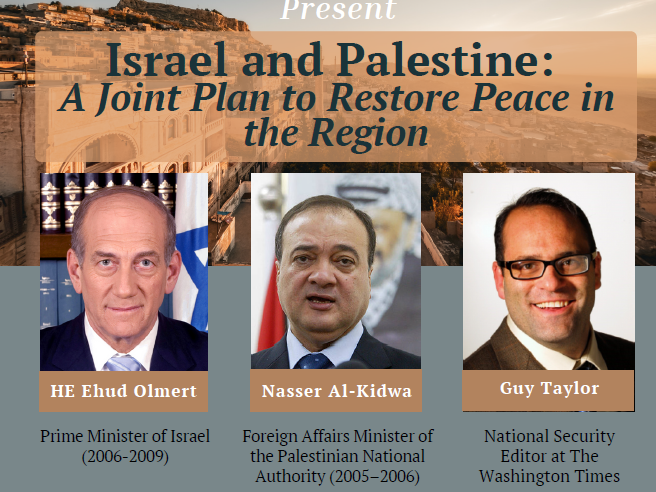UPF-EUME – Even in places where war is still raging – or especially in such places – we search for signs of hope: what must we do to restore peace? In a webinar on December 16, 2024, UPF's Middle East Peace Initiative invited Mr. Guy Taylor of the Washington Times to moderate a one-hour discussion of a new proposal for peace between Israel and Palestine. Mr. David Fraser-Harris, secretary general of UPF Middle East and North Africa, introduced the program, and Dr. Michael Jenkins, president of UPF international, gave the closing remarks.
In July 2024, Israel's former prime minister and the Palestinian Authority's former foreign minister put forward a proposal that could breathe new life into a two-state solution. Mr. Ehud Olmert, who was elected twice as the mayor of Jerusalem, served as prime minister of Israel from 2006 to 2009. Dr. Nasser Al Kidwa, who is the nephew of historic PLO leader Yasser Arafat, represented the Palestinian Liberation Organization at the United Nations from 1991 to 2005, after which he served as foreign minister of the Palestinian Authority until 2006. In July of last year, these two leaders launched and signed their proposal; in October they presented it to Pope Francis.
UPF invited both leaders to join the webinar. As Prime Minister Olmert indicated in his opening remarks: "I hope Dr. Al Kidwa will join us … I feel comfortable when we are talking together because this is a joint initiative; this is a proposal that we drafted together and signed and published back in July." Seeing that Dr. Al Kidwa didn't manage to join the program, Mr. Taylor hosted an extended discussion with Mr. Olmert, who laid out the main points of the proposal and its potential going forward.
Mr. Olmert was at pains to point out that the proposal is not a comprehensive peace agreement or a peace plan. "This is, I think, a proposal of the principles that we have outlined for the end of the war in Gaza and for the negotiation of a two-state solution between Israel and the Palestinian Authority," he said.
It includes recommendations for ending the Gaza war include releasing hostages, the release of Palestinian prisoners, halting Israeli military actions, withdrawal from Gaza and establishing an independent security force to prevent future violence. For the two-state solution, they suggest borders near pre-1967 lines, with land swaps and connected territories. On the status of Jerusalem, they propose shared governance of the Old City through a UN-endorsed international trust.
For the administration of Gaza, they propose a Council of Commissioners, a technocratic body linked to the Palestinian Authority. The task of this council would be to manage Gaza's recovery and prepare for elections within a defined timeframe. To make the transition possible they propose a temporary Arab security presence which could be made up of Palestinians, Egyptians, Jordanians, Emiratis, Saudis and perhaps other Muslim and Arab countries.
Neither speaker was under any illusion as to the extent of resistance to such proposals from the current leadership, both Israeli and Palestinian; likewise, the exasperation and outrage felt by both Palestinians and Israelis after all that has happened recently; not to mention public skepticism on both sides regarding the feasibility of a two-state solution after years of conflict. "No one thinks we can wipe away the ideas of Hamas," Mr. Olmert said, adding that the proposed disarmament and exclusion of Hamas from future governance will undeniably be a major challenge.
Mr. Taylor also probed the prime minister’s views on the implications of recent developments, including the fall of the Assad regime in Syria and its impact on regional stability, and on the potential role of a new U.S. administration under President Donald Trump in energizing Arab cooperation and advancing peace initiatives.
There is no doubt that even presenting such a proposal at this juncture requires both vision and courage. As Mr. Taylor said in his closing remarks, "Prime Minister Ehud Olmert, thank you so much for speaking so freely, and thank you for calling for peace, for bringing hope to the prospect that peace can and must happen."
A video recording of this webinar can be found here.

















